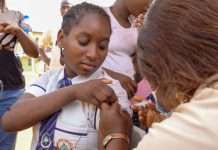By Temitope Obayendo
As the rest of the world usually celebrate World Hepatitis Day, on the 26th July, of every year, Mega Lifesciences Nigeria Limited joined in this year’s commemoration by taking hepatitis awareness campaign to twenty hospitals across the nation, as well as screened patients in the hospitals for the disease.
The hepatitis campaign which took place in hospitals in Lagos and outside Lagos simultaneously on the 26th and 27th of July, 2013, enlightened and screened thousands of patients at the Lagos State University Teaching Hospital (LASUTH), General Hospital, Lagos, General Hospital, Ikorodu Ado Ekiti Teaching Hospital, General Hospital, Ijebu Ode, Gwagwalada Teaching Hospital, Dalhatu Arab specialist hospital, Lafia, University of Benin Teaching Hospital (UBTH) among others.
Speaking with Mr. Maneesh Mehre, managing director, Mega Lifesciences Nigeria Limited, he said they have embarked on the initiative as a means of performing their corporate social responsibility to benefit citizens of the country where they operate, as well as to improve their health status.
According to Mrs Caroline Dada, chief nursing officer (CNO), Gastro OPD, LASUTH, hepatitis is a more deadly disease than HIV/AIDS, and it has no symptoms.
“Hepatitis is the inflammation of the liver, and we have various types such as Hepatitis B, V, and A. Their causative organisms are different .The deadly virus that infects people is called Hepatitis V virus. The cause is unknown, and it’s more deadly than HIV virus, because HIV causes AIDS while HPV causes hepatitis. Its spreads through contaminated foods, water, blood transfusion from an infected person, and other blood contacts with an infected person. Hepatitis B is more prevalence in African countries than the others”.
The CNO who urged everyone to go for screening, in order to be sure of his hepatitis’ status, said prevention is better than cure, because it will cost between half a million and a million naira to cure hepatitis B, whenever a patient is down with the disease.
“Maintenance of a good hygienic system, coupled with a good lifestyle is paramount in the prevention of hepatitis. Adults who are yet to be immunized against the disease should go for HPV immunization which will last for five years, while children from zero to two years must take HPV 1, HPV2, and HPV 3, and adults who are yet to be immunised against the disease must take the HPV immunisation for five years. However, everybody should go for screening to know his or her status, so that they can be treated accordingly”.

Also speaking with Dr. Rufina Igetel, consultant hepatologist, LASUTH, in an exclusive interview on the disease, she noted that over three hundred million people are infected with hepatitis B all over the world. Coming down to African countries and Nigeria in particular, though she said there are no specific data on Nigeria, but she said twelve per cent of the Sub-Saharan region’s population is infected with hepatitis B virus.
“Based on the division according to the epidemiology, we have a very high prevalence in this part of the world, in the Sub-Saharan African, and South East Asia, close to twelve per cent of the population are infected with hepatitis B virus. We are very concerned about it, because some of our patients are chronic carriers, or those who have been chronically infected with the virus. Many of them do not accept it, they may not be aware, and they are capable of transmitting it to other people”.
“And we know the ways the virus is being transmitted, usually through the same route as HIV/AIDS, to simplify matters. People who are in the habit of sharing sharp objects like common clippers at the barbers’, even in the house, family members who share sharp objects like razor blade, shaving sticks, and sometimes tooth brushes among children”.
The hepatologist also explained the various subtle ways of spreading the virus that people may not be aware of. She said other means of transmitting the virus are through indiscriminate use of needles by quacks in the chemists; traditional pedicure; those who go to the saloon to fix weavons, and so on. Some of those saloons still share needles among their clients, only few saloons dispose their needles after usage. These subtle ways of spreading these diseases are very dangerous because the carriers may not have symptoms and they may not be aware of their status and what you are ignorant of, you can’t do anything about it.
“In the long time, what we are afraid of is the damage to the liver. It is possible for the liver to be damage through chronic inflammation, which is not treated in time. And when the liver is not able to cope anymore, then majority of the liver cells is damaged”.
“Over the years, since we started the awareness campaign, due to some level of collaboration between us and some organizations, we have some corporate bodies that screen their employees before employing them, and we have had people who are asymptomatic, and they still benefit from monitoring and treatment, before its gets to the level where the liver is damaged”.













